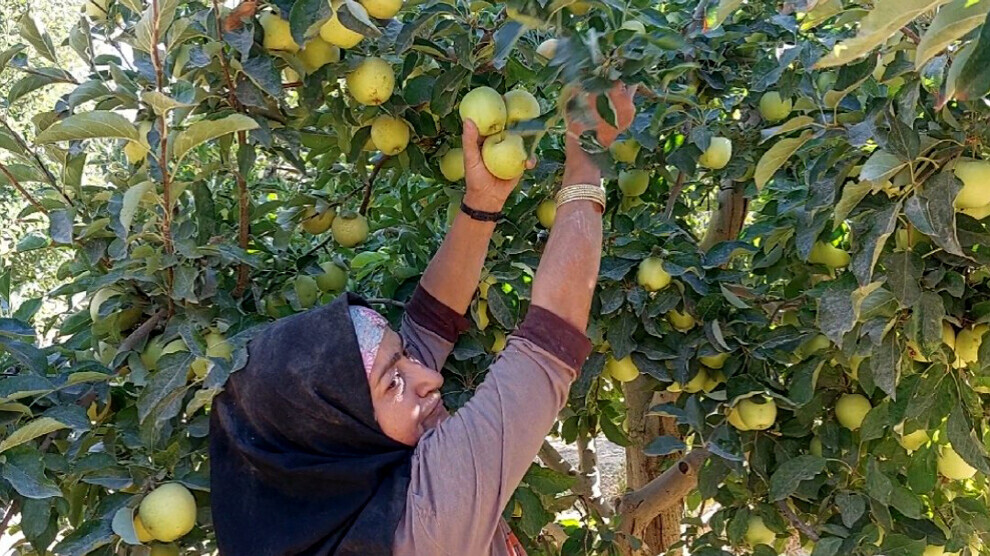Women Working in Urmia’s Apple Orchards Demand Equality
Urmia is shaped by its vast apple orchards and the labor of women who rely on seasonal work. Bearing heavy responsibilities both in the orchards and at home under harsh conditions, these women struggle against poverty while demanding an equal life.

NÎAN RAD
Mahabad – Urmia province is one of the important agricultural and horticultural centers of Iran and Rojhilat. The province’s economy largely depends on agriculture. With more than 50,000 hectares of apple orchards, it ranks first in apple production in the region. For this reason, thousands of people, including women and children, are employed mostly seasonally in the apple orchards. They take part in harvesting, sorting, packing, and labeling. Since factories and formal job opportunities are limited in the region, these difficult and demanding jobs are a source of hope for many people. However, many women still cannot benefit adequately from these opportunities.
Most women, even after returning home—whether their families are busy in the orchards ormen they live with are engaged in other work—are obliged to cook lunch for the next day and take care of household chores. Apple harvesting in Urmia usually takes place at the end of summer and the beginning of spring, during which workers’ daily wages increase. This autumn, each worker earns 800,000 tomans per day; however, none of them have personal insurance. Although women are working, when asked where their income goes, it is often revealed that they do not receive a share of their own wages.
“I Have No Savings”
Looking at the crowds working in the orchards, it is clear that the majority of the workers are women. One of the seasonal workers, 30-year-old Mahnaz K., has been doing seasonal work for several years because she has no other choice. Describing how her day begins, Mahnaz says:
“Every morning we wake up at 3:30. At 4:00 we go to the orchards by minibus. Our work starts at 6:00 and continues until 16:00 in the afternoon. I cover the family’s expenses. I have no savings because my father takes all my money. Right now, I don’t even have a single rial with me. My father takes everything I have. Our life is hard and we barely make ends meet.”

Working Conditions Are Difficult
Another seasonal worker, Fatmeh M., who started working for the first time this year, highlights the difficulties of the job: “We start work at 6:00. First we climb the trees to pick the apples, then we collect those that have fallen underneath and separate the good ones from the bad ones. We do this work for about a month, and the apple harvest must be completed.”
One of the women, Kjal A., says: “With the money I saved from my work over several years, I bought a car for my son. This year, I want to buy some gold for my daughter so she can manage her living expenses a little.”

They Cannot Spend the Money They Earn
Masoumeh J., who works together with her husband, says: “I give all my money to my husband to cover the expenses of autumn and winter.”
Mina A. also has no ownership over her wages. She says: “The man I live with takes everything I earn, and I don’t even know how much it is. If it were up to me, I would help him and save money; but now, I have to beg even for a piece of fabric.”

Men See Themselves as the Owners of Wages
According to women, with the development of capitalism, the sense of ownership has also begun to be questioned. In the patriarchal social structure, the labor of women—who are forced to work at home and in the fields without wages—still goes unrecognized by the men of the family; men see themselves as the rightful owners of wages. The majority of the women working in Urmia’s apple orchards, however, are voicing their demand for equality.
